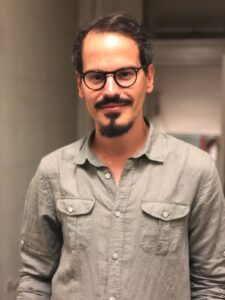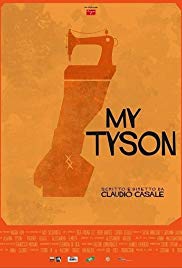Claudio Casale is a busy filmmaker, but recently he found the time to speak with New York Film Academy (NYFA). It was here that he attended our 8-week Filmmaking workshop in April 2017, where he quickly added an arsenal of skills to his already impressive filmmaking prowess.
“Claudio was one of those students a teacher is so happy to have in the class,” tells his NYFA directing instructor, Thomas Barnes, continuing, “brilliant, passionate, original, and supportive of his colleagues.”
Claudio has been incredibly productive since finishing the Filmmaking workshop, working on all sorts of different projects—short films, feature films, narratives, documentaries. In the summer of 2018, he achieved a career highlight when his documentary My Tyson won the MigArti Best Documentary Award at the Venice International Film Festival.

Claudio spoke with NYFA about that film and win, as well as filmmaking in general, working in documentary, and what lies ahead for him:
New York Film Academy (NYFA): First, can you tell us a bit about yourself and what brought you to New York Film Academy?
Claudio Casale (CC): I was born and raised in Rome, Italy. I graduated in Business Management, and at 22 I took two years abroad, mainly in India and Southeast Asia, where I started filmmaking constantly. Many shorts later, NYFA was the first proper education I received on filmmaking. I was mostly self-taught and I joined the 8-week program to gain experience on set dynamics and directing actors.
NYFA: Can you tell us about your film My Tyson?
CC: My Tyson is a 15-minute short doc on Alaoma Tyson, an Italian teenager born in Italy from Nigerian parents. Today, at 18 years old, Tyson is the Italian boxing champion in the youth heavyweight category. Patience, his mother, sews traditional clothes for the Nigerian community in the Roman suburb they live in.
As Tyson trains for his next match, Patience tells him the story of their family, revealing ancient rituals, financial struggles, and a severe migration experience.
My Tyson premiered at the 75th Venice International Film Festival where it won the MigrArti Best Documentary Award.
NYFA: What inspired you to make My Tyson?
CC: Migration is an issue worldwide, from the US all the way to Australia. In Europe, Italy is the first port of arrival for the majority of migrants and asylum seekers from Africa and Maghreb. As many filmmakers of my generation, I felt the need to take a stand on this issue, by offering to the audience a perspective that might get lost in the news cycle. Observation and research was key, as I had to find the story – and therefore my inspiration – on the field: I spent five months with Alaoma Tyson and his family before shooting a single frame.
NYFA: How did you get your film involved with MigrArti?
CC: MigrArti is a yearly call made by the Minister of Culture in Italy (MiBAC). The production working with me on My Tyson had to submit a detailed dossier for our project. MigrArti can be very competitive, and I was honoured that our project was among the selected ones. Watching our short doc premiere during the 75th Venice International Film Festival was really emotional, and I feel grateful that the Jury awarded My Tyson as MigrArti Best Documentary.
NYFA: What are your plans for My Tyson after Venice?
CC: We are sending out My Tyson to festivals, as that’s a great way to receive professional feedback and connect with fellow filmmakers. I would be delighted to personally attend international festivals as well, so to see by myself how different audiences relate to the story.
On the other hand, in Italy we are planning screenings solely for migrants, thanks to the cooperation of NGOs such as ARCI Solidarietà Onlus. Bringing cinema to places where it usually hasn’t belonged, like migration centres and public schools, is a duty as well as a chance to test the impact our little film may have on people we can’t reach with a traditional theatrical run.
Then, at the end of the festival distribution, at least in Italy we are working to have a selected theatrical distribution, likely paired with a feature documentary.
NYFA: What other projects are you working on or do you plan to work on?
CC: In September, I was in Sicily to direct a narrative short film in 35mm, Inshallah, about to enter post-production. Also, I have a feature documentary in creative and financial development, in which I will invest most of my time this year. It’s a project I am very attached to and I can’t wait to get myself on set to shoot it.
NYFA: What did you learn at NYFA that you applied directly to your work on My Tyson, or your work in general?
CC: Among the lessons I received at NYFA, two came particularly handy in this project. First, as director you have got to leave the camera to the operator! As many native-digital filmmakers, I also grew very attached to the camera body (I was my own operator on my first shorts). It wasn’t necessarily easy to delegate that, as it is an act of trust toward the operator, especially on a documentary where things happen out of script and must be captured instinctively.
But at NYFA, I learned to do just that: trusting the crew I work with and delegating everything that may distract me from the scene. In some projects I would still be my own operator of course, but thanks to NYFA I could recognize that My Tyson wasn’t one of those cases.
Second: directing actors! I find the method taught at NYFA to be extremely effective. Honestly, that module alone was worth the whole course for me. With time, I changed it a little to adapt it to documentaries, where you don’t direct actors but subjects, so the relationship is more subtle and the non-actors’ spontaneity is the first priority and must always be protected. I believe that directing actors and non-actors is what ultimately makes a director great, and that’s something hard to learn without seeing some experts at work, either by joining a school or by being on set as 1st or 2nd AD.
NYFA: Do you prefer working in narrative or documentary filmmaking?
CC: When I started shooting, I had only narrative filmmaking in mind, and frankly I still look forward to direct a feature narrative one day. Documentary happened by chance, yet for the moment I found my little niche here.
As for today, I certainly prefer working on documentary filmmaking for a variety of reasons: first, it’s cheaper, so development and pre-production are generally quicker compared with narrative. Second, you can easily practice rhythm and pace with a running time of 52 minutes or longer, a key area of learning for any aspiring director. Last but not least, documentary today is wide open to visual experimentation, an ideal condition for me.
NYFA: What differences or similarities do you find between narrative and documentary filmmaking? 
CC: Comparing short films only, in my opinion the key advantage of documentary filmmaking is the level of experimentation it allows. I honestly find narrative short films too rigid sometime, as nowadays the pressure to deliver the highest possible production value risks to overpass the focus aspiring directors should be putting into the storytelling.
After all, short films are the only tool we have to discover who we really are as visual storytellers. The similarities between narrative and documentary filmmaking are more than one could tend to believe: year after year, more documentaries are shot with a real cinematic language in mind. And I believe that’s one of the reason behind today’s boom of documentaries: many narrative storytellers are getting into documentary, shaping it with their own tools.
On the other hand, generally speaking, narrative filmmaking may allow for a wider freedom of expression, especially if you get to write and direct your own script. In conclusion, I would suggest students to be open to both forms, as for different reasons they are equally important in the early stage of a filmmaker’s career.
NYFA: What other advice would you give to students just starting out at NYFA?
CC: If you are a total newbie on filmmaking, be ready to run and absorb everything you’re told. Raise your hand and ask your classmates for help, as at the end of the day, it’s all about the teamwork.
While If you have some filmmaking experience already, as I did, be ready to put everything you know aside. Don’t let your previous knowledge block you from learning further. Be open and receptive, and you will take something new and essential with you every day.
NYFA: Anything we missed you’d like to speak on?
CC: No questions about the Deli down in Battery Park? I must admit, sometimes I miss that sushi! 🙂
The New York Film Academy thanks Claudio Casale for his time and thoughtful answers, and looks forward to seeing what inspiring films he comes out with next. We sincerely hope he comes back to New York for a visit sometime and has some sushi from the Deli downstairs!